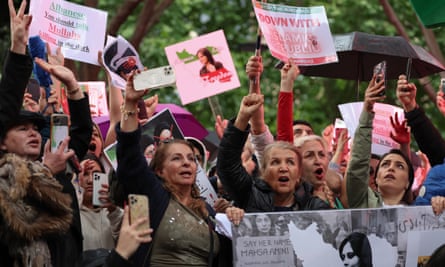Worldwide protests are being held in solidarity with the growing uprising in Iran demanding greater freedom and protesting against the death of Mahsa Amini following her arrest by Iranian morality police.
Demonstrations under the slogan “Women, life, liberty” are taking place in many major cities, including Rome, Zurich, Paris, London, Seoul, Auckland, Melbourne, Sydney, Stockholm and New York.
Efforts were also under way inside Iran on Saturday to launch a national strike, mainly in the country’s Kurdish cities, as well as the non-payment of taxes to the government.
Public anger flared after Amini, a 22-year-old Kurdish woman, died in custody on 16 September, three days after her arrest for allegedly breaching Iran’s strict rules for women on wearing hijab headscarves and modest clothing.
After probably the single most violent incident of the protests, security officials were claiming security had been restored in the city of Zahedan, in eastern Iran’s Sistan and Baluchistan province, where the police had fired on civilians during Friday prayers.
As many as 40 people are reported dead after protests were sparked by stories that a policeman had raped a woman.
Local hospitals were inundated with wounded people and a police station was torched in rioting that continued overnight.
The commander of the local intelligence unit of Iran’s Islamic Revolutionary GuardCorps (IRGC) was killed, official Iranian government sources confirmed.

Videos on social media showed burnt out fire engines, bus stations and banks. The government claimed the riots, including shots fired from the crowd, were orchestrated by terrorist groups, but the protesters said the police were firing into crowds at prayer.
What will concern the government is if the disparate and apparently leaderless protests, revealing a cultural chasm inside Iran, start to coalesce into a nationwide movement across classes with specific goals.
The Iranian state, however, has infinite tools for repression of dissent, complete control of the media, including TV, and a track record of being able eventually to suppress protest even at the cost of much human life.
The intelligence services issued a lengthy statement on Friday blaming the protest on foreign agents and terrorists. They highlighted that 85 ambulances had been attacked, and hardline MPs continued to denounce the protesters.
Student groups claimed that in more than 110 universities, faculties and educational centres went on strike and held a student sit-in in protest against the suppression of street protests following the loss of life.
Social media showed protests in campuses across the country. More than 100 university professors have signed a statement demanding the release from detention of their students, adding: “Everyone should appreciate the existence of students who are ready to sacrifice themselves and pay the price to defend freedom, justice and human dignity.”
Earlier, the Cooperation Center of the Iranian Kurdistan’s Political Parties had called for a nationwide strike, urging support for young Iranians demanding freedom and oppression of women inside Iran.
The strike call was being honoured in large parts of Kurdistan, with reports of police shootings in some major towns such as Dehgolan close to the border with Iraq.
In the south there were protests at the strategic port of Bandar Abbas.
From house arrest, the reformist politician and former Iranian prime minister Mir-Hossein Mousavi sent out a message urging the security forces to side with the people. He said: “Armed forces! The powers vested in you are for defence of the people, not their repression; for protection of the oppressed, not service to the powerful and mighty. The hope is that you will stand on the side of truth and the nation. Your duty is secure the peace for the millions and especially the downtrodden, and not to consolidate the power of oblivious officials.”


